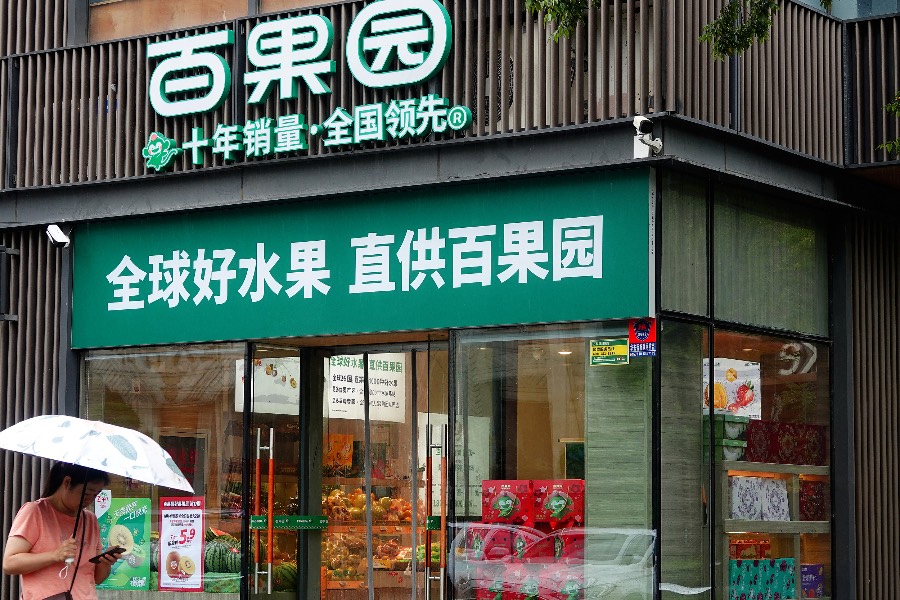Pagoda finds fruit in share placement as weak business weighs

Not long after reporting bleak midyear results, the fruit seller raised $42 million in fresh funds by selling new stock at a steep discount
Key Takeaways:
- Pagoda Industrial has raised HK$327 million through a share placement, a month after reporting it swung to a loss of more than 350 million yuan in first half of 2025
- The struggling fruit seller slashed its retail network by nearly 30% to 4,386 stores in the first half of the year
By Bai Xin Rui
China’s sprawling retail fruit sector, worth an estimated 1 trillion yuan ($140 billion) in annual sales, is dominated by a trio of sellers. To the south there’s Pagoda, in the north it’s Xianfeng, and in the west it’s Hongjiu. The southern branch of that tree refers to Shenzhen Pagoda Industrial (Group) Corp. Ltd. (2411.HK), which, despite its enviable position in one of China’s wealthiest regions, hardly looks too healthy these days.
The company continued to wilt in the first half of the year, reporting its revenue and profit both sagged under the weight of growing consumer caution and its own operational issues. The company appeared to further undermine its investment base last week when it unveiled a new share placement at a steep 19% discount to its stock price at the time.
The specialty fruit seller disclosed it agreed to sell 279.5 million new shares at HK$1.17 apiece, equal to about 16.1% of its enlarged share capital. Adding to the disappointment of such a big dilution, the sale price represented a discount of nearly 20% to the stock’s close of HK$1.45 the previous day. The placement raised HK$327 million ($42 million), with HK$200 million tagged for settlement of trade payables and another HK$100 million to pay down bank debt.
Despite the big discount, Pagoda’s shares rallied 20% the next trading day and continued to climb after that. One week later, they are up nearly 50% since the placement announcement, returning to levels last seen in July.
Pagoda was established in the southern boomtown of Shenzhen in 2001, and listed in Hong in January 2023. According to its prospectus at that time, it was China’s largest fruit retailer but controlled just 1% of the country’s vast market. Its major shareholder is Chairman Yu Huiyong, whose stake was diluted from 19.5% to 16.5% in the latest placement, even as he remains the company’s single largest shareholder.
Mounting losses
Pagoda looked solid in the first year after its listing, reporting its net profit rose by a juicy 11.9% to 362 million yuan in 2023. But it began to slip the next year as Chinese consumers began to grow more cautious follow a brief post-pandemic rebound. Its net profit for the first half of 2024 tumbled by 66.1% to 88.51 million yuan, and it swung to a 386 million yuan loss for the full year. As that happened, its shares plunged 76.9% in 2024.
The company blamed its plunging fortunes last year on intensifying competition, changing consumer demand, and challenges created by adjustments to its own operational cycle. As its performance declined, Pagoda began aggressively buying back its shares, purchasing about 49.2 million last year for HK$68.37 million. Concurrently, it paid a final dividend of 0.0065 yuan per share for 2024, despite its plunge into the red.
The share repurchases have stopped this year, though the sea of red ink continued with a loss of 342 million yuan in the first half of 2025 and a 22% revenue decline to 4.38 billion yuan. At the same time, the company’s short-term bank borrowings stood at nearly 2.3 billion yuan, while its non-current bank borrowings totaled another 267 million yuan. And its gearing ratio has climbed steadily from 89.3% at the end of last year to 103.5% by the end of June as its operations faltered.
As its situation deteriorated, Pagoda began aggressively relocating or closing laggard stores with high rental and labor costs or poor operating results, focusing on its best performers. In that process, its retail network shrank by more than a quarter year-on-year as it dropped a net 1,639 outlets to bring its total to 4,386.
Wasteful supply chains
China’s retail fruit market is vast in scale but highly fragmented, with the top five players collectively controlling just 3.6% of sales. While that implies significant potential for consolidators like Pagoda, the company and its peers are having to deal with major supply chain efficiencies that extend well beyond slumping consumer demand.
As domestic brokerage Kaiyuan Securities notes, China offers a diverse range of highly perishable fruits, each with its own distinct quality benchmarks and storage requirements. Compounding the problems, sellers must source their products from numerous farms, growers, and distributors across a wide array of regions and complex supply chains.
That creates inventory management nightmares for many distributors, resulting in systemic inefficiencies. Fruit supply chains perpetually suffer from low storage efficiency and high wastage rates, with the overall spoilage rate in China’s fresh produce supply chain reaching 25%. That, in turn, creates a significant obstacle to improving profitability.
To reduce spoilage and achieve greater operational efficiency, companies are responding with advances in modern cultivation and agritech. The sector is increasingly incorporating digital technology to enhance product quality, cut wastage, and sharpen operating efficiency.
Seeking to address such pain points, Pagoda has constructed seven national hubs and 428 city-level warehouses across China, aiming to better meet the sourcing needs for the wide array of retailers that sell its products.
After all the bruising its stock has taken, Pagoda currently trades at price-to-book (P/B) ratio of just 0.2 times, while its price-to-sales (P/S) ratio hovers below 1 – which both typically reflect depressed valuations. Signs that its gross margins could be bottoming out could provide some support at current price levels.
But the company’s declining revenue persists – a trend that’s likely to continue as the economy slumps and Pagoda keeps reducing its store network. At the center of the malaise is a Chinese property market that remains sluggish, which is dampening demand from consumers who aren’t feeling too wealthy these days. That’s pressuring not only Pagoda and its peers, but China’s entire retail sector. At the same time, the company needs to spend heavily to keep upgrading its infrastructure to become more efficient, meaning Pagoda’s outlook faces many hurdles that could limit its appeal in the near- to mid-term.
To subscribe to Bamboo Works weekly free newsletter, click here





